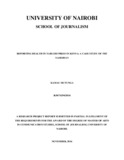| dc.description.abstract | The power of the mass media in creating awareness, increasing knowledge, changing attitudes and perceptions, and altering behaviour cannot be gainsaid. While various developmental issues such as government policies, access to justice, health and environmental degradation are the preserve of mainstream broadsheets in the Kenyan print media, the tabloid press is hardly considered a channel of disseminating development agenda with equal seriousness, largely due to the melodramatic nature of tabloid content. This research explores how tabloid press covers health issues in Kenya. This study uses The Nairobian newspaper as a case study to explore how it reports health as a development communication issue. This research is premised on the agenda-setting and health belief model theories of communication. Qualitative and quantitative approaches were used, with content analysis of The Nairobian employed as a research method. A sample of 200 articles from 52 issues published between January and December 2015 were used as the study population, with 52 of them as the sample frame. This study reveals that in the face of serious issues being left to broadsheet or mainstream newspapers, tabloid press, like The Nairobian, could be playing a more serious role in disseminating and thus making health issues accessible to the masses more than it is assumed to be the case. Indeed, use of sensationalism and titillation of stories, including health matters, makes the development agenda relevant to the target demographics of The Nairobian, besides elevating issues of mass interest into public debate. The study concludes that the market for broadsheets, the main channels of communicating serious development agenda, has been shrinking, while that of tabloids – at least in Kenya – has been expanding and thus „red sheets‟ like The Nairobian could be more effective as „alternative public spheres‟ of ventilating development agenda on health matters | en_US |



